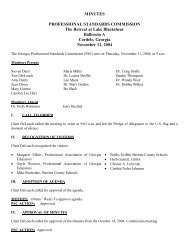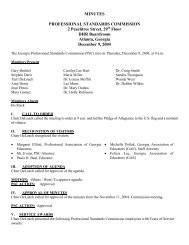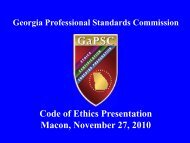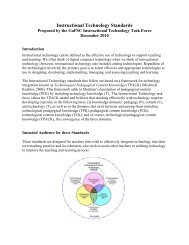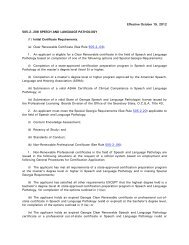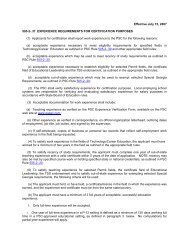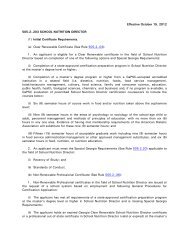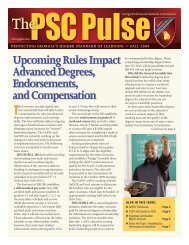PRS - GaPSC
PRS - GaPSC
PRS - GaPSC
You also want an ePaper? Increase the reach of your titles
YUMPU automatically turns print PDFs into web optimized ePapers that Google loves.
Professional Development. Opportunities for professional education faculty to develop new knowledge<br />
and skills through activities such as in-service education, conference attendance, sabbatical leave, summer<br />
leave, intra and inter-institutional visitations, fellowships, work in P-12 schools.<br />
Professional Development Schools. Specially structured schools in which the P-12 school and higher<br />
education faculty collaborate to (1) provide practicum, student teaching, and internship experiences; (2)<br />
support and enable the professional development of school and higher education faculty; (3) support and<br />
enable inquiry directed at the improvement of practice; and (4) support and enhance student achievement.<br />
Professional Development Schools require the institutional commitment of colleges and universities,<br />
school districts, and teachers’ organizations.<br />
Professional Dispositions. Professional attitudes, values, and beliefs demonstrated through both verbal<br />
and non-verbal behaviors as educators interact with students, families, colleagues, and communities.<br />
These positive behaviors support student learning and development. NCATE and the <strong>GaPSC</strong> expect<br />
institutions to assess professional dispositions based on observable behaviors in educational settings. The<br />
two professional dispositions that NCATE and the <strong>GaPSC</strong> expect institutions to assess are fairness and<br />
the belief that all students can learn. Based on their mission and conceptual framework, professional<br />
education units can identify, define, and operationalize additional professional dispositions.<br />
Professional Education Faculty. Those individuals employed by an institution, including graduate<br />
teaching assistants, who teach one or more courses in education, provide services to candidates (e.g.<br />
advising), supervise clinical experiences, or administer some portion of the professional education unit.<br />
See adjunct faculty, clinical faculty, full-time faculty, higher education faculty, part-time faculty.<br />
Professional Education Unit (Unit): The institution, college, school, department, agency, or other<br />
administrative body with the responsibility for managing or coordinating all programs offered for the<br />
initial and continuing preparation of teachers and other school personnel, regardless of where these<br />
preparation programs are administratively housed. The professional education unit must include in its<br />
accreditation/approval review all programs offered by the institution for the purpose of preparing teachers<br />
and other school professional work in pre-kindergarten through twelfth grade settings.<br />
Professional Knowledge. The historical, economic, sociological, philosophical, and psychological<br />
understandings of schooling and education. It also includes knowledge about learning, diversity,<br />
technology, professional ethics, legal and policy issues, pedagogy, and the roles and responsibilities of the<br />
profession of teaching.<br />
Professional Standards. Standards set by the specialized professional associations (SPAs) and adopted<br />
by NCATE for use in its approval review. Professional standards also refer to standards set by other<br />
recognized national organizations/accrediting agencies that evaluate professional education programs<br />
(e.g. National Association of Schools of Music).<br />
Professional Standards Commission. (<strong>GaPSC</strong>) An eighteen-member body appointed by the Governor<br />
of Georgia with responsibility for the preparation, certification, and conduct of certified, licensed, or<br />
permitted personnel employed in the P-12 schools of Georgia.<br />
Proficiencies. Required knowledge, skills, and professional dispositions identified in professional, state,<br />
or institutional standards.<br />
Program. A planned sequence of courses and experiences for the purpose of preparing teachers and other<br />
school professionals to work in pre-kindergarten through twelfth grade settings. Preparation programs<br />
may lead to a recommendation for a state certificate, both, or neither.<br />
51



